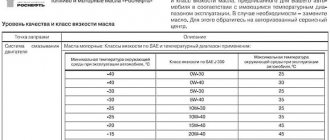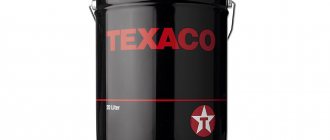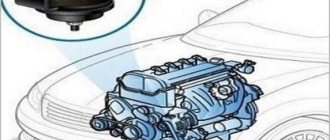Oil selection parameters
The best lubricant will be the one that meets the car manufacturer's recommendations. Such information can be found in the technical documentation for the vehicle. The main parameters include the following: quality class, viscosity index and composition.
Oil quality
All motor oils are classified according to API classification. The parameter was developed and introduced by the American Institute of Quality. Has a letter designation. The first letter indicates the engine type, namely:
- S – for gasoline engines;
- C – for diesel.
There are oils that are suitable for all types of engines, then both letters in the marking are indicated through a fraction.
The second symbol is the degree of performance characteristics. Here, the further the letter is in the alphabet, the better the quality of the lubricant. Today's best brands with the designation: CF for diesel and SN for gasoline.
Sometimes the oil is not API certified. Then there will be no letter markings on the label.
Oil viscosity
This indicator indicates the ability of oil to linger on parts and components of the car in the form of an oil film without losing its fluidity. Has SAE classification. The parameter is indicated on the canister with a number next to the letter W.
The first digit indicates the minimum permissible engine starting temperature. For example, 5W30 - subtract 30 from 5, we get -25°C. This means you can start the car at a temperature not lower than -25 degrees.
The second number indicates the maximum and minimum viscosity of the lubricant in the operating temperature range. There are oils with two markings at once, in which case a lower indicator applies to a new engine, and a higher one for a used engine.
Oil composition
Oils are divided into three main types depending on their composition. This includes:
- Mineral - lubricant is obtained by distilling fuel oil. In rare cases, they are made from industrial agricultural crops. This oil is inexpensive, but it is not particularly high quality. For example, they can evaporate. But there are also positive aspects - efficient and stable work.
- Semi-synthetic - the basis of the composition is mineral oils (usually 50 - 70%) with the addition of synthetic additives. Their cost is lower than synthetic ones, and at the same time they have better technical characteristics in comparison with mineral compounds. Works well in temperate climates without sudden temperature changes.
- Synthetic - obtain lubricant by primary oil refining. Considered the best oils. They have good fluidity and do not lose properties when exposed to external factors. They have a wide range of operating temperatures. They are among the most expensive, but at the same time they provide reliable operation in conditions of even very low temperatures.
In addition to the above, the label may indicate other parameters that depend on the manufacturer. Sometimes specific car brands for which the lubricant is developed are noted. Although this does not guarantee that the fluid meets the automaker's standards. It is still recommended to focus on the technical parameters of the oil.
What kind of oil to pour into the engine
We will fill a new car with synthetics without question. This formula has higher thermal stability and is not afraid of either overheating or low temperatures.
With it, the engine works without problems, even in winter or summer. Even a heavy load on the engine and high speeds will not cause synthetics to lose their properties, and resistance to chemical reactions allows this oil to retain its beneficial qualities for a very long time.
Now let's decide what to feed the machine, which has run and seen in its lifetime. You can’t rely on the advice of friends and acquaintances, “This oil is good, I always use it,” because you need to take into account not only the make of your car, but also its age, mileage, and technical condition.
If the manufacturer allows the use of different oils: 5W30, 5W40 and 10W40,
The manufacturer recommends filling in oil with certain tolerances . And if these tolerances are for 5W30, 5W40, and 10W40, then you can fill in the one you like best.
But the car already has hundreds of thousands of miles on it, so many people do not recommend synthetics. The engine is quite worn out, its compression is lower, but there are large gaps between the rings and cylinders. Due to the thickness of the oil film, the oil will not provide the required compression.
Mileage is not an indicator! The condition of the engine is more important!
If the car is not an oil guzzler, then the 5W40 option will be optimal. Otherwise, 10W40 remains, but starting will be worse, especially in cold weather.
What to rely on when choosing oil
The main task that oil performs in an engine is to lubricate its moving parts. To effectively reduce friction, the fluid must be selected correctly. It is also important to fill it in sufficient volume.
Choosing oil based on seasonality
Motor oils are divided into three categories depending on the time of year of use:
- Summer - characterized by high viscosity to ensure normal operation at high temperatures. Most often they have a synthetic or semi-synthetic composition.
- Winter - have a lower viscosity and increased fluidity compared to summer. Mostly synthetic product.
- All-season - work over a wide range of temperatures with the same viscosity and fluidity.
Oils of the latter category are considered universal and are more popular, displacing other lubricants.
Selection of oil for a gasoline engine
It is important to take into account the characteristics of the engine and the climate zone. In warm conditions, it is more convenient to use mineral compounds; for the middle zone and closer to the northern part - semi-synthetic and synthetic lubricants.
Selection of oil for a diesel engine
The specifics of engine operation should be taken into account. In order for the car to last for a long time, it is very important to control and fill only high-quality fluids. Since the fuel does not burn completely in it, more detergent and dispersant additives are needed. They keep soot in suspension and prevent carbon deposits from forming on pistons and cylinders.
According to the API classification, the oil should not be below CD, and according to ACEA - not less than B1. If a turbocharged engine manufactured in 1990 or later is installed, the required lubricant class is CE and B2 and higher. In addition, do not forget about the car manufacturer’s recommendations for viscosity.
What do the numbers on engine oil mean?
The main parameter of motor oil is its viscosity. It changes in heat and cold, so the classification of oils is based on the ability to maintain their properties in a specific temperature range.
There are 6 classes for use in winter temperatures: 0W, 5W, 10W, 15W, 20W, 25W.
And 5 – for summer: 20, 30, 40, 50, 60.
The smallest number means the “thintest” oil. The higher, the thicker. The meanings are explained in a special table.
The letter W is “winter”, meaning “winter”. The number in front of it shows how cold the oil will withstand.
0W is the lowest temperature, down to -35°C, and 20W is the “highest” winter temperature, up to – 10°C.
Difficult? Then I'll try to explain it differently.
The lower the first number, the thinner the oil in the cold season .
The second number is the limit of high temperatures in summer. The number 30 corresponds to a temperature from +20°C, and the marking 60 corresponds to a temperature from +50°C and above.
Example: brand 10W-30 is suitable for operation from -20-25°C in cold weather and up to +20-25°C in hot weather.
Many people think so and write that the oil can be used in the summer up to such and such a temperature. But that's not true! The engine heats up to 90°C both in winter and summer.
The second number shows fluidity at 100°C.
Most oils are now made universal. For example: 5W40 means all-season oil, it can be used all year round.
Thus, the markings 0W30, 5W30, 5W40 are synthetic oil, and 10W40 is semi-synthetic, even if the can says “Synthetic with the addition of mineral water.”
Engine oil 5w30 and 5w40 what is the difference
The best 5W40 synthetic motor oils
Lubricants marked 5B40 are very popular due to their versatility. Shows excellent performance both in severe frosts and in summer heat. It contains anti-corrosion, anti-acid and detergent additives. The oil works equally well when driving around the city and on highways.
SHELL Helix HX8 Synthetic 5W-40
The lubricant is excellent for engines running on gasoline, diesel and gas. They have approvals from well-known automakers such as Fiat, BMW, Renault, Ferrari, etc.
The oil has a fully synthetic composition, protects the engine and its components well from premature wear and increases service life. Suitable for all lubrication periods. Due to the low consumption, it needs to be added much less frequently. Freezing temperature -50 °C.
Advantages:
- API approvals;
- suitable for use in city traffic jams;
- oil works even at -35 °C;
- a large set of additives;
- natural base.
On the downside, sometimes there is increased consumption at high driving speeds.
Takayama 5W-40 API SN/CF
The brand's oil is distributed in metal canisters for ease of storage and transportation. The energy-efficient lubricant is compatible with heavily loaded diesel and gasoline engines. Pour point -40 °C.
A well-thought-out composition prevents the formation of sediments inside the engine, and also minimizes friction of components and parts. Complies with international environmental protection standards. The liquid is all-season. Can be used in new engines and with high mileage.
Advantages:
- convenient container;
- a large set of additives;
- reduces engine noise;
- oil prevents the formation of soot;
- certified product.
There is only one minus - sometimes it is difficult to find on store shelves.
LUKOIL Genesis Armortech 5W-40
It is an inexpensive but high-quality synthetic oil, recommended for use in diesel and gasoline power plants. The production uses new DuraMax® technology. The lubricant is an all-season lubricant, therefore completely universal. Freezing point -41 °C.
Recommended for use by the most famous car manufacturers, such as Mercedes, Renault, Skoda, BMW, Porsche, etc. Suitable for cars compatible with API SN, ACEA A3/B3, A3/B4 standards.
Advantages:
- a large set of useful additives;
- the oil works well under increased loads;
- ensures reliable starting at low temperatures;
- compatible with Russian fuel.
The main disadvantage is the presence of a large number of counterfeit goods.
Best Engine Oils – 10 Best Engine Oils for 2021
Experienced car enthusiasts know and understand the importance of using high-quality fuels and lubricants. Car owners often neglect the choice of motor oil; others conduct a thorough analysis of prices and manufacturers, but still do not find an option.
Find out the cost of an oil change online in 3 minutes
Don't waste your time - use the Uremont search and get offers from nearby services with specific prices!
The best semi-synthetic oils 10W40
Oils marked 10B40 are semi-synthetic. They are produced by combining a mineral base with synthetic additives that provide the desired performance characteristics. More often used in engines with high mileage. The products are very popular among car owners and are of the all-season type.
G-Energy expert G
Designed to improve the performance and power of engines with a mileage of 100 thousand km or more. Thanks to the use of innovative technologies, the oil film provides reliable protection of the engine and rubbing parts throughout the entire period of operation of the fluid.
Advantages:
- ensures reliable engine tightness;
- the composition of the oil meets environmental requirements;
- reliable starting at low temperatures;
- stable operation in engines with high mileage.
Among the shortcomings, the small number of vehicle permits should be noted. In addition, it is used only on worn-out engines.
Zic X5
A widely known product among car owners of foreign cars, especially those made in Korea. Lubricant is purchased by automakers such as Hyundai and Kia. Oil is consumed very economically, so topping up will not be required during its operation. To avoid purchasing a surrogate product, you should carefully inspect the canister upon purchase. The quality of the plastic should be good and the text should be easy to read.
Advantages:
- anti-acid composition of the oil;
- stable operation under high loads;
- the oil is suitable for any season;
- excellent cleaning properties.
The only downside is the presence of a large number of fakes.
Sintec Super 10W-40
Excellent lubricant for high mileage engines. The composition contains a large number of useful additives that improve the technical characteristics of the liquid. They prevent oil leaks, provide an anti-corrosion coating, and restore the performance characteristics of old parts.
Advantages:
- all-season;
- a large number of additives;
- stable engine starting even in severe frosts;
- protection against soot.
Of the minuses, it is worth mentioning that at the end of the operational period, a dark coating may appear.
Types of oils
It is extremely important to change the engine oil in the engine on time, because the “fresh” it is, the better the engine works. Before purchasing a new product, the question arises: which one is better to choose? Let's figure it out.
There are several types:
- Mineral - the oldest type, consists only of natural ingredients. A good option for engines with high mileage. The oil does not tolerate low temperatures well, it cannot be used in winter, but it cleans the engine very well of carbon deposits in summer.
- Semi-synthetic - consists of natural substances with the addition of artificially synthesized compounds. More resistant to low temperatures than mineral. It has good viscosity and is in stable demand among car owners.
- Synthetic – artificially created. Withstands both high and low temperatures without significant changes in viscosity. A good choice for the winter. However, it is not recommended for use in older engines.
Oils differ in viscosity, temperature stability, starting qualities and many other characteristics reflected in their API and SAE classifications .
Therefore, it is very important to choose an oil of the appropriate class and suitable for your engine.
The best 5W30 motor oils
5W30 brand oils are the most popular among synthetic oils. Perfect for driving in city traffic jams and for high-speed travel on highways. However, this does not apply to lubricants from all manufacturers, so it is important to know which one to choose.
The viscosity indicator is considered universal - the oil can be poured into premium and budget cars. Below are the most popular 5W30 lubricants.
Lukoil Genesis Claritech 5W-30
Lukoil motor oil is excellent for gasoline and diesel engines. Can be used at any time of the year, as it is all-season. Extends the life of the motor and its parts. Provides better functioning of the exhaust gas after-treatment system.
Advantages:
- stable start-up at sub-zero temperatures;
- no fakes;
- relatively low cost of oil;
- small expense.
There is only one minus, it is a short service life.
LIQUI MOLY Special Tec AA 5W-30
Thanks to innovative technologies, the use of this oil reduces fuel consumption and protects parts from premature wear. Anti-corrosion and anti-acid additives prevent the destruction of metal, and the detergent additive prevents the formation of carbon deposits on the pistons and in the cylinder. Excellent for American and Asian-built cars, on which it was most often tested.
Advantages:
- saving fuel consumption;
- oil keeps the engine clean;
- sufficient fluidity ensures quick access of lubricant to parts.
The main disadvantage is that it is suitable mainly for Korean, Japanese and American cars.
MOBIL 1 ESP Formula 5W-30
Mobile oil is well suited for all types of engines and is all-season. A set of additives ensures the cleanliness of all systems and their reliable operation. Protects the engine well and reduces fuel consumption.
Advantages:
- oil extends engine life;
- economical consumption;
- stable start in cold weather.
The main disadvantage is the high cost of the product.
Selection of oils according to API performance level
The classification of the American Petroleum Institute is the world's today. API quality class is indicated by two letters. The first means applicability (S-Service - for gasoline engines, C-Commercial - for diesel engines), the second - the level of performance characteristics. Most often, oils are universal and can be used in both gasoline and diesel engines (for example, API CI-4/SL). The older the letter in the English alphabet, the higher the level.
For example, API SM has higher performance than API SL. More detailed information about the API classification of motor oils is in our article. Separately, it is worth noting API SN oils, which can be used in engines running on biofuel, and API SP, intended for gasoline engines equipped with turbocharging and direct fuel injection (GDI, TSI, etc.).
Conclusion: whenever possible, it is worth using oils of the latest standards. However, be careful, some new standards (for example, API CK-4) limit the maximum sulfur content of the fuel, so the use of low-quality, “dirty” fuel can lead to very rapid burnout.
The best 0W20 motor oils
Superfluid motor oils are designed for use in engines with reduced operating clearances. They first appeared in 2005 for the Asian automobile industry. Low-viscosity lubricants are increasingly being used by Japanese automotive manufacturers.
Most 0W-20 fluids have a viscosity index above 200. Kinematic viscosity at 100 degrees is 5.6.
IDEMITSU 0W-20 SN/GF-5
Relatively inexpensive low-viscosity oil from Japanese manufacturers. Has API, SN, ACEA approvals. Freezing temperature -44 °C. A fairly good lubricant that meets all quality standards and ensures reliable operation of the engine and all its systems. It is used very economically and quickly gets to the nodes.
Advantages:
- low cost of the product;
- the oil contains organic molybdenum;
- provides good protection for rubbing parts;
- does not lose properties throughout the entire period of operation;
- stable engine starting at low temperatures.
One of the disadvantages is only suitable for some Japanese and Korean cars.
ZIC Zero 0W-20
A product with an excellent price/quality ratio. Fully synthetic composition with a small addition of PAO and innovative additives based on ionic liquid. Suitable for replacement on modern gasoline engines with direct injection. Has API, SN Plus, ACEA approvals. Freezing temperature -42 °C.
Advantages:
- many permissions;
- liquid ion technology;
- organic molybdenum in the composition;
- high-quality additive package;
- stable operation under heavy loads;
- reduces fuel consumption.
At this cost and performance characteristics there are no disadvantages.
G-Energy Far East 0W-20
Synthetic oil belongs to the energy-saving category. Available for gasoline engines from Japanese and Korean automakers. Has API, SN, ACEA approvals. Therefore it is suitable for most modern engines. Freezing temperature -48 °C.
Advantages:
- adapted to Russian operating conditions;
- has molybdenum;
- the oil shows good performance at low temperatures;
- good additive package;
- reduces engine noise.
No deficiencies were found in the oil.
What kind of oil should be poured into the engine
We recommend purchasing motor oils only from official dealer representatives, trusted service stations and specialized stores.
It is very important to take into account certain properties and characteristics of oils for automobile engines:
- Type of automobile oil. Today the most popular are mineral, synthetic and semi-synthetic oils;
- Engine oil quality class. Motorists should pay attention to the class marking: ACEA (CCMC), APJ or ILSAC;
- Oil viscosity.
The best 5W50 motor oils
5B50 is a synthetic seal designed to protect rubbing engine parts from premature wear. Their main advantage is maintaining sufficient viscosity in the temperature range from -30 to +50 °C. They are not in particular demand among Russian car owners due to their high cost and the presence of a large number of fakes.
An excellent choice for sports cars that are subject to heavy loads and high operating temperatures. For such engines, a special oil with SAE classification is required.
MOBIL 1 5W-50
Fully synthetic oil from an American manufacturer. It features high performance characteristics. It has a good set of additives that protect the engine from corrosion, friction of parts and elevated temperatures.
When used on older engines, the oil shows an excellent cleaning and restoring effect. The composition does not change during the entire service life of the liquid. The mileage declared by the manufacturer is about 15 thousand km.
Advantages:
- complex of active additives;
- excellent price/quality ratio;
- good cleaning properties;
- long service life;
- excellent protection of rubbing parts.
Among the disadvantages, we can note the considerable cost, but the high quality of the product completely compensates for the disadvantage.
LIQUI MOLY Synthoil High Tech 5W-50
Excellent all-season oil from a German manufacturer. Has a huge number of approvals ACEA A3, ACEA B4, API CF, API SM. It is poured into cars produced from the assembly line in Germany.
When used on engines with high mileage, it is cleaned and restored. The freezing point of the liquid is -39 °C. The lubricant is changed after a mileage of 12 thousand km. However, experts recommend replacing in portions every 10 thousand to avoid complete depletion of the additives.
Advantages:
- price/quality at the highest level;
- quite long service life;
- stable engine starting even in severe frosts;
- An excellent choice for a worn out engine.
No deficiencies were identified in the oil.
Ravenol Racing Rally Synto RRS SAE 5W-50
Fully synthetic composition from a German manufacturer. The additive package ensures good performance on forced turbocharged engines. The development of the composition was carried out in close cooperation with the Ford Corporation.
Can be used in most gasoline-powered vehicles. The lubricant has a long service life - up to 15,000 km.
Advantages:
- huge working period;
- stable operation under heavy loads;
- a large package of supplements;
- reliable protection of rubbing parts.
The only downside is the high cost of the product.
How to choose motor oil: reviews from car owners
- German quality is as always at its best “I trust only German quality. I only take it for my car. I usually use LIQUI MOLY Top Tec 4100 5W-40 oil. I have enough oil for 15 thousand km of driving. Although perhaps we should not forget about the quality of the engine oil, how you drive and much more. I'm happy with my choice."
- Ours have long learned to make normal oil. “I spent a long time studying reviews and articles on the Internet about Russian-made oils. A bunch of different analyzes and tests. Finally, our people began to make a worthy product. Synthetic oils from Tatneft are generally in great demand. The foreign analogue is several times more expensive"
- I chose it myself and I don’t regret it “I had a Lada about 15 years ago. They advised me to fill it with BP visco oil, but I couldn’t find it. I had to pour Castrol 0W-40 for 2 years. I sold the car later, the buyer then called me and thanked me. He said the engine was like new. However, the seller of motor oils assured me that Castrol should not be poured into the VAZ, as synthetic oil could leak from the engine...”
- I gave up Shell, chose Rolf - it got better “I drove a Hyundai and used Shell oil. After a while I noticed that a lot of oil began to leak: about 100 ml for every 1000 km. During the technical inspection they found heavy carbon deposits on the pistons. I had to change the oil. I asked around among friends and acquaintances and ended up buying ROLF 3-synthetic 5W30. After use, I went back for maintenance; no carbon deposits were found on the pistons.”
The best engine oils for diesel engines with particulate filters
Diesel engines require not only a constant presence of fuel in the system, but also a special oil composition. It should provide good lubrication of friction elements, reducing friction and pressure in the system, increase trouble-free operation and protect against wear. Therefore, it is important to know which motor oils meet the requirements of diesel engines.
IDEMITSU Zepro Euro Spec 5W-40
Synthetic oil from Japanese manufacturers. It has standard quality, perfectly lubricates engine parts, and shows stable viscosity even at low temperatures. Also pleasing is the complete absence of fakes. An excellent choice for a forced engine with turbines.
The additive package not only protects the engine from corrosion and wear, but also has a good effect on the condition of the particulate filter. During operation, there was a lack of carbon deposits, as well as an improvement in the dynamic properties of the motor.
Advantages:
- works in frosts down to -50 °C;
- high quality of goods;
- no fakes;
- good additive package;
- Excellent performance on turbodiesels.
The only disadvantage noted is the high cost.
SHELL Helix HX7 5W-30
Premium oil with low cost from an American manufacturer. Meets European quality standards and is widely known throughout the world. The additive package ensures sufficient fluidity at sub-zero temperatures and reduces engine noise.
Advantages:
- all-season;
- a large set of additives;
- oil prevents the formation of soot and deposits;
- ensures reliable starting in cold weather;
- relatively low cost.
Among the disadvantages, it is worth noting the high fluidity of the liquid and a large number of counterfeit goods.
Mannol Diesel TDI 5W-30
Fully synthetic composition from a famous German brand. Recommended by experts for diesel Volkswagens, Mercedes and BMWs. It has high fluid permeability even during a cold start.
Meets all quality standards. Thanks to the additives, it received cleaning and anti-corrosion properties. An excellent choice for cars with a particulate filter.
Advantages:
- high quality;
- convenient container;
- the oil is used in cars with a particulate filter;
- stable start-up in severe frosts;
- compliance with all quality standards.
Among the shortcomings, the high cost of the product is noted. In addition, it is only suitable for passenger vehicles.
What is the difference between synthetic and semi-synthetic motor oil?
To produce mineral motor oil, petroleum is used, and it can be subjected to both distillation and refining. These types of oils are usually divided into paraffinic and naphthenic oils.
Mineral oils are characterized by a high percentage of various additives, which affects the high rate of loss of the lubrication effect. The quality of mineral oils directly depends on the type of hydrocarbon. The advantages of mineral motor oil include its low price.
Synthetic oils are a quality product with chemical reactions that improve the quality of the fluid. It is synthetics that are characterized by chemical resistance and resistance to temperature changes.
Oil compatibility
If the question of which motor oil is better: synthetic or semi-synthetic has already been resolved, another difficulty may arise - how to correctly switch from one oil to another. There is various information about this on auto forums, but in reality everything here is quite simple:
- When replacing a synthetic oil with identical parameters with a semi-synthetic one (or vice versa) from the same manufacturer, mixing is permissible.
- When switching from semi-synthetics to synthetics (or vice versa) with different parameters or from different manufacturers, it is advisable to flush the engine.
The latter is due to the fact that mixing oils with different parameters can worsen the properties of both, and each manufacturer uses its own set of additives, and it is unknown how they can interact with each other and what the reaction will be.
We also recommend that you read other articles on this topic: How often do you change engine oil? To wash or not to wash - is flushing necessary when changing engine oil? Understanding motor oils
A few words about engine oil additives
9 best fuel additives
There are many products available in stores today that are designed to ensure optimal performance for your engine. Many can be poured directly into your car's engine or fuel tank.
But the fact is that reputable motor oils have already been tested to provide the best performance for your engine. Adding chemicals to your oil can negatively impact its overall performance, so it's always best to first make sure you choose the right additive for your vehicle's engine oil.
Motor oil is the lifeblood of your car's engine.
Thus, it is fundamentally important to choose the right type of oil to fill the engine.
Best mineral oil
Lukoil 15W-40
In the age of technology and progress in the development and production of fuels and lubricants, only mineral compounds remain out of work.
Such chemical compositions cannot boast of anything other than price. Typically, mineral oils contain a large number of additives, from thickeners to toxic components that negatively affect the service life of the car engine and the environment.
Now that all cars are equipped with injectors, fuel consumption of 6 liters per 100 km is the norm, and the list of the best motor oils does not even smell of mineral water - its use is a very dubious idea.
Mineral compounds are of mediocre quality, poor environmental friendliness and are prone to coking the engine. Regular mineral water is perfect for old and simple cars, such as Volga or Zhiguli.
Pros of Lukoil 15W-40
- Edge low cost.
- Availability.
- Ideal for older cars.
Cons of Lukoil 15W-40
- Archaic tribocomposition.
- Not suitable for modern cars.
- Poor environmental performance.
- Poor viscosity and volatility.
Decoding the designation of motor oils
The machine oil on the packaging has a marking corresponding to its class and characteristics, based on which it is easy to choose the optimal product for your own use:
- The first number indicates pumpability in the corresponding functional temperature range - the time it takes for the oil to enter the system after starting the engine. The closer it is to zero, the lower the operating temperature.
- The letter designation W - identifies the lubricant as winter.
- The second number is viscosity. The higher the indicator, the stronger the density when the engine heats up.
Understanding the markings will allow you to choose the appropriate lubricant even without a specification.
TOP motor oils 10w40
At elevated average annual temperatures, it is necessary to fill in the best motor oil of the 10w40 category.
- Castrol Magnatec - demonstrates first-class performance when working in difficult conditions of Russian roads and moderate fuel quality.
- TOTAL Quartz 7,000 is initially the best semi-synthetic motor oil for gasoline engines. It was subsequently improved and now does not reduce the performance of units running on liquefied gas or diesel.
- Motul ATV-UTV 4T - dilutes our rating with a lubricant intended for motorcycles. French products that provide reliable levels of protection, cleaning and performance enhancement.
- Lukoil Standard SF/CC will be an excellent choice for protecting mechanisms over the years. Low cost, versatility and smooth operation ensure the use of this mineral oil.
- ZIC A+ Gasoline VHVI is a semi-synthetic with an optimal price, enhanced protection characteristics and first-class engine protection.
By choosing the 10w40 marking on the canister and focusing on the rating presented, you can easily provide yourself with the best product in terms of price/quality ratio. Using the same principle, you can choose the best alarm system of 2018-2019.











